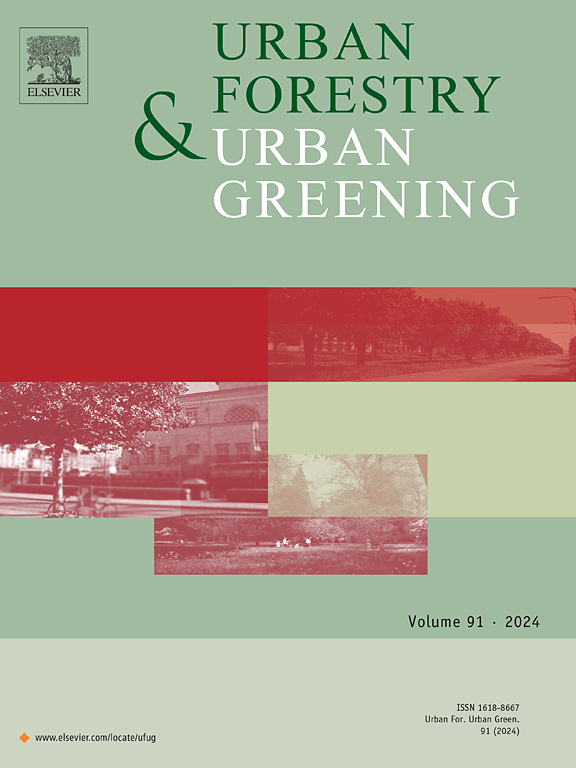Who are urban farmers? A typology of goals, motivations, and reasons for urban farming
IF 6.7
2区 环境科学与生态学
Q1 ENVIRONMENTAL STUDIES
引用次数: 0
Abstract
There is an increasing interest in urban agriculture to support community development, food system resilience, and food security. The purpose of this study was to gain a deeper understanding of the reasons that people become commercial urban farmers, what motivates them to farm, and the goals they hope their farms will achieve. Because there is such great variation in urban agriculture activities, this study sought to identify salient characteristics of commercial urban farmers to create a typology. To gain rich data that could provide a deep understanding of farmers’ perspectives, a qualitative approach was used for this study. We conducted semi-structured interviews (n = 29) of commercial urban farmers in Florida. While all interviewees were commercial farmers, they all expressed a variety of goals beyond profit-making, including, notably, goals related to environmental sustainability, improving food security, and community resource development. A hierarchical cluster analysis revealed three primary groups of farmers: Newcomer Idealist Environmentalists, Ethical Civic Stewards, and Business-minded Community Builders. This understanding of urban farmers’ goals, motivations, and reasons for farming, coupled with the understanding of these three distinct clusters provides the foundation to develop targeted educational tools and resources. Understanding the goals that farmers seek to achieve for their farms can help local governments and nonprofits identify ways to partner with and support urban farms to achieve mutually supported goals in their communities.
谁是城市农民?城市农业的目标、动机和原因类型学
人们越来越关注城市农业,以支持社区发展、粮食系统恢复力和粮食安全。本研究的目的是为了更深入地了解人们成为商业城市农民的原因,他们耕作的动机,以及他们希望农场实现的目标。由于城市农业活动存在如此巨大的差异,本研究试图确定商业城市农民的显著特征,以创建一个类型学。为了获得丰富的数据,以便深入了解农民的观点,本研究采用了定性方法。我们对佛罗里达州的商业城市农民进行了半结构化访谈(n=29)。虽然所有受访者都是商业农民,但他们都表达了除盈利之外的各种目标,特别是与环境可持续性、改善粮食安全和社区资源开发有关的目标。分层聚类分析揭示了农民的三个主要群体:新来者理想主义环保主义者、道德公民管家和有商业头脑的社区建设者。对城市农民从事农业的目标、动机和原因的理解,加上对这三个不同群体的理解,为开发有针对性的教育工具和资源提供了基础。了解农民为他们的农场寻求实现的目标可以帮助地方政府和非营利组织找到与城市农场合作并支持他们在社区中实现相互支持的目标的方法。
本文章由计算机程序翻译,如有差异,请以英文原文为准。
求助全文
约1分钟内获得全文
求助全文
来源期刊

Urban Forestry & Urban Greening
FORESTRY-
CiteScore
11.70
自引率
12.50%
发文量
289
审稿时长
70 days
期刊介绍:
Urban Forestry and Urban Greening is a refereed, international journal aimed at presenting high-quality research with urban and peri-urban woody and non-woody vegetation and its use, planning, design, establishment and management as its main topics. Urban Forestry and Urban Greening concentrates on all tree-dominated (as joint together in the urban forest) as well as other green resources in and around urban areas, such as woodlands, public and private urban parks and gardens, urban nature areas, street tree and square plantations, botanical gardens and cemeteries.
The journal welcomes basic and applied research papers, as well as review papers and short communications. Contributions should focus on one or more of the following aspects:
-Form and functions of urban forests and other vegetation, including aspects of urban ecology.
-Policy-making, planning and design related to urban forests and other vegetation.
-Selection and establishment of tree resources and other vegetation for urban environments.
-Management of urban forests and other vegetation.
Original contributions of a high academic standard are invited from a wide range of disciplines and fields, including forestry, biology, horticulture, arboriculture, landscape ecology, pathology, soil science, hydrology, landscape architecture, landscape planning, urban planning and design, economics, sociology, environmental psychology, public health, and education.
 求助内容:
求助内容: 应助结果提醒方式:
应助结果提醒方式:


